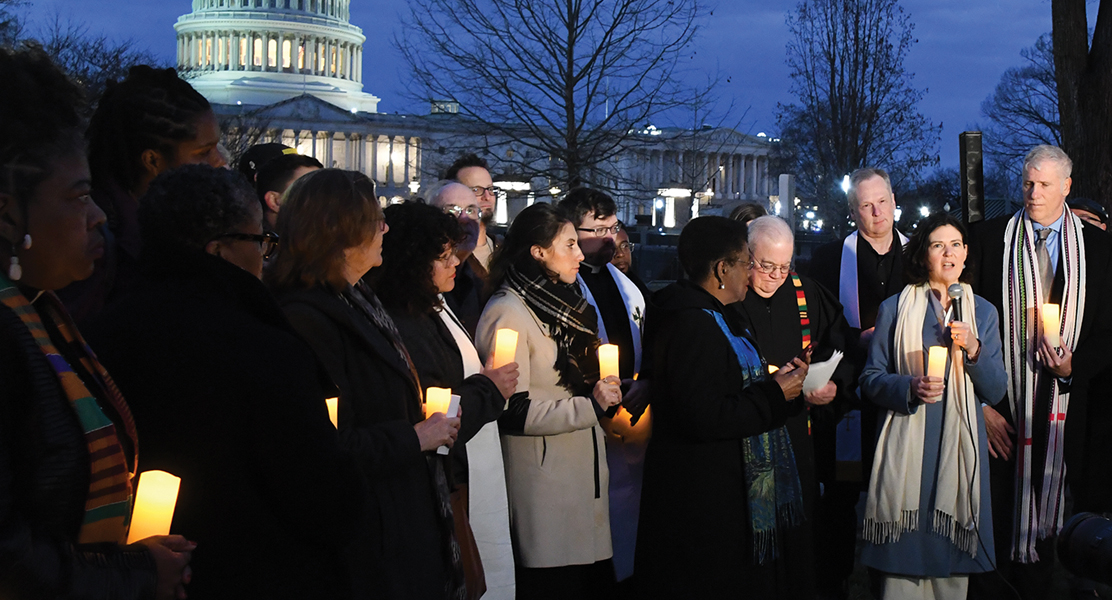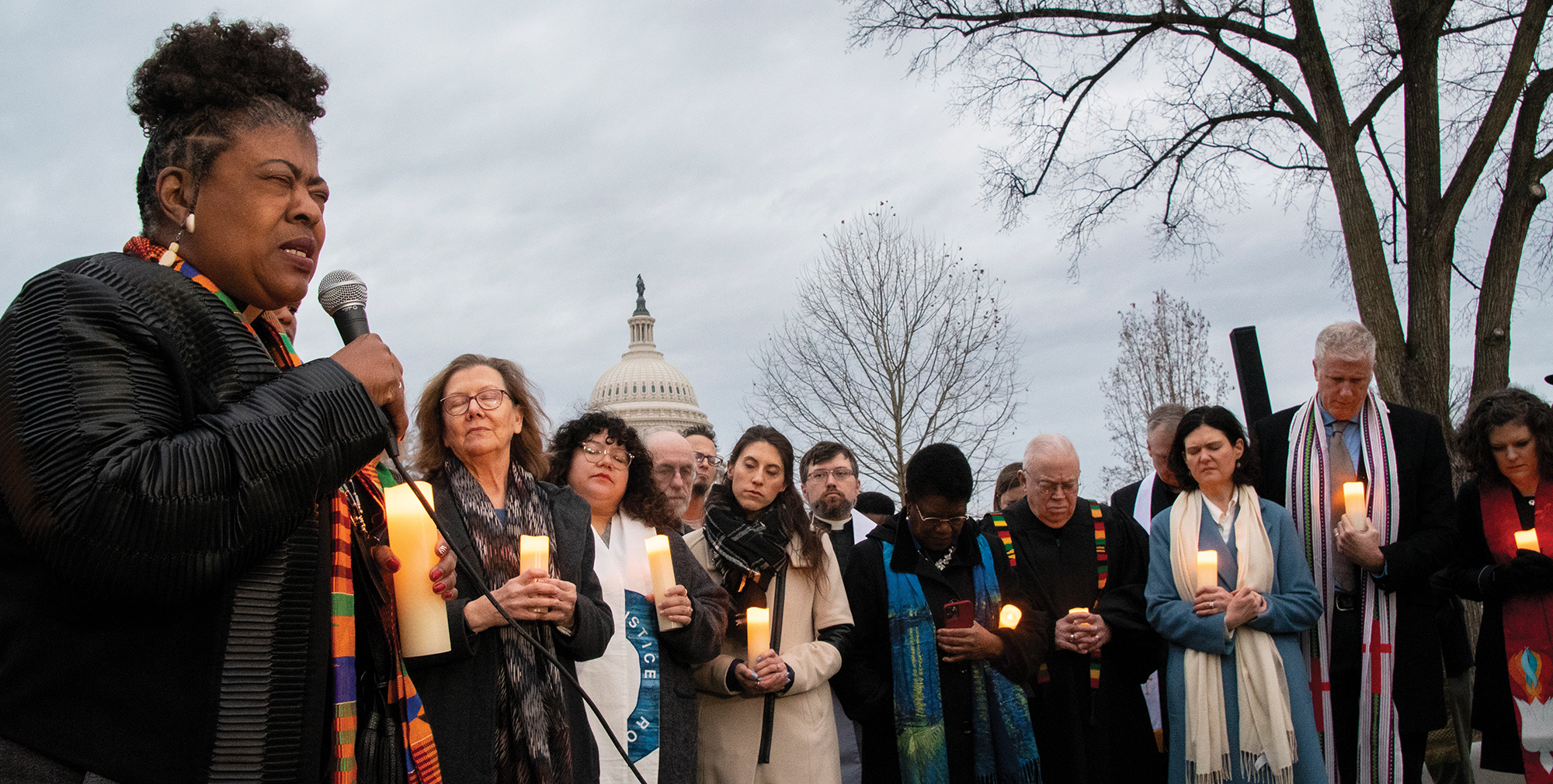Remembrances and a report: Two years after January 6
Faith leaders gather at dawn, and the Select Committee’s report comes out without mentioning Christian nationalism

Two years after a violent mob attacked the U.S. Capitol, a solemn scene emerged as our country remembers and moves forward.
On January 6, 2023, Christian leaders gathered at dawn to pray on the same ground overrun by insurrectionists two years earlier. They remembered those we lost, honored those who defended our country, recognized the trauma suffered by many and prayed for our nation.
The gathering, organized by BJC’s Christians Against Christian Nationalism campaign and Faithful America, provided a different message than those holding Christian symbols and waving Christian flags as they attacked the Capitol on January 6, 2021.
“This morning, we are providing a counter-witness, a way to bring our faith into the public square in productive ways,” said BJC Executive Director Amanda Tyler at the vigil.
Christian nationalism is a political ideology and cultural framework that seeks to merge Christian and American identities, often misappropriating Christian symbols and Christian language to point not to Jesus but to a political figure, party or ideology. The leaders called out Christian nationalism both as a distortion of Christianity and something that threatens our country’s system of government.
“We reflect today on the January 6, 2021, insurrection,” said the Rev. Dr. Barbara Williams-Skinner, co-convener of the National African American Clergy Network. “Thank you, God, for holding back the tide of white minority rulership and white supremacy that shamefully includes white Christian nationalism in an increasingly diverse America.”


January 6 Select Committee Report
The gathering came two weeks after the release of the highly-anticipated report from the Select Committee to Investigate the January 6th Attack on the United States Capitol.
Published December 22, 2022, the 800+ page report included an examination of the “Big Lie” regarding false claims about the 2020 election results, various legal theories and a detailed analysis of the attack on the U.S. Capitol. It also had 11 specific recommendations, including proposed laws, reforms to criminal statutes and referrals for prosecution.
The report was the result of the bipartisan January 6 Select Committee’s extensive work over two years. The Select Committee and its staff interviewed more than 1,000 witnesses, held multiple hearings — some in primetime — and obtained millions of pages of documents. But, the detailed report did not include the role of Christian nationalism in justifying and bolstering the attack.
“We cannot fully understand the attack on the Capitol without reckoning with the role of Christian nationalism in events leading up to it and on that infamous day,” Tyler said.
The final report’s failure to mention the role of Christian nationalism was not due to a lack of information.
In February 2022, BJC and the Freedom From Religion Foundation co-published the most comprehensive report to date on Christian nationalism and the insurrection. And in June, BJC organized a letter from Christian leaders asking the Select Committee to investigate the role Christian nationalism played in the attack.
“This investigation into Christian nationalism is important so that history does not repeat itself and so that we understand this threat to our country’s historic commitment to religious liberty and the importance of defeating it,” the letter said, which was signed by prominent Christian leaders representing The Episcopal Church, Evangelical Lutheran Church in America, Presbyterian Church (U.S.A.), United Church of Christ, National Council of Churches, Sojourners, and NETWORK Lobby for Catholic Social Justice.
While Christian nationalism was not called out by name in the report, the ideology made appearances during the hearings. For example, at the end of the June 9, 2022, hearing, video shown of the attack included an attacker waving the Christian flag. During the June 13, 2022, hearing, a person interviewed in video footage was wearing a shirt that said, “I stand for the flag, I kneel for the cross.” The idea that the U.S. Constitution has been “divinely inspired” was mentioned several times by both witnesses and Rep. Liz Cheney, R-Wyo. At the very first public gathering on July 27, 2021, D.C. Metropolitan Police Officer Daniel Hodges testified, “It was clear the terrorists perceived themselves to be Christians,” noting he saw the Christian flag and a flag saying “Jesus is my savior, Trump is my president” in the hands of the attackers.
On episode 10 of season 4 of the Respecting Religion podcast, Tyler and BJC General Counsel Holly Hollman discussed their disappointment that the final report did not explore the role of Christian nationalism. They pointed to a likely hesitation to wade into the issue and fear it would be seen as an attack on Christianity.
“We believe it would have been helpful and appropriate for the Select Committee to recognize [Christian nationalism]’s impact,” Tyler said.
The report marked the culmination of the Select Committee’s work — the group was disbanded by the new 118th Congress. But, there are continuing repercussions from its work.
“We know that several members of the committee either did not run for reelection or lost their reelection bids, in part because of the polarizing nature and how this work became partisan,” Hollman said on the podcast.

A new witness to the day
While Christian symbols continue to surface in images of the January 6 attack, the 2023 prayer vigil took note of the impact that has on people and how they might see Christianity.
“Christians bear a special responsibility in continuing to draw awareness to Christian nationalism, working to explain how it is a threat to our democracy and to showing how it is a gross distortion of the Christian faith that we hold dear,” Tyler said at the vigil.
Jeanné Lewis, the interim CEO of Faith in Public Life, shared the importance of staying focused on Christ instead of misusing his name to advance political agendas. “We know that Christ invites everyone to the table, and that every one of us is equally beloved in your eyes,” she prayed.
The Rev. Dr. Cassandra Gould, senior faith strategist for the Faith in Action network, prayed for justice and for Christians to reclaim their identity.
“We come this morning because the identity of Christians was stolen and paraded around on the steps and in the House two years ago today,” she prayed.
“Time is up for white Christian nationalism,” she continued. “We come this morning to say that we stand against the idol that white Christian nationalism and the fraudulent God of white supremacy has erected.”
“As the sun rises around our Capitol this morning, remind us of the new day that is dawning because of your creative work,” prayed the Rev. Emily Holladay, pastor of Village Baptist Church in Bowie, Maryland. “Help us to join you in action toward justice so that our country might see the transformation that we know is possible because of you.”
Several prayers came from leaders representing a wide variety of Christian backgrounds, calling for Christ’s love for all.
The Rev. Nathan Empsall, executive director of Faithful America, concluded the vigil by praying for those going to work at the Capitol and for those whose loved ones were injured or killed there as a result of the attack.
“We know that white supremacy and Christian nationalism are not Christian, and yet the people who espouse this ideology are our fellow Christians,” he said. “Help us always remember this, that we may not be corrupted by hate.”
You can watch a video of the vigil on Faithful America’s Facebook page and on the Instagram page of BJC.

This article first appeared in the spring 2023 edition of Report from the Capital. You can download it as a PDF or read a digital flip-through edition.




